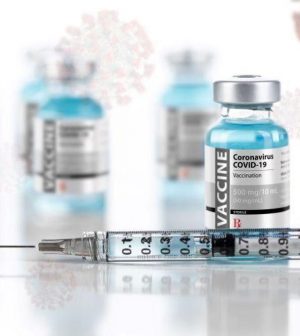- 10 Strategies to Overcome Insomnia
- Could Artificial Sweeteners Be Aging the Brain Faster?
- Techniques for Soothing Your Nervous System
- Does the Water in Your House Smell Funny? Here’s Why
- Can a Daily Dose of Apple Cider Vinegar Actually Aid Weight Loss?
- 6 Health Beverages That Can Actually Spike Your Blood Sugar
- Treatment Options for Social Anxiety Disorder
- Understanding the Connection Between Anxiety and Depression
- How Daily Prunes Can Influence Cholesterol and Inflammation
- When to Take B12 for Better Absorption and Energy
COVID Protection Wanes After 2 Doses of Pfizer Vaccine: Study

Protection can gradually fade after a second dose of the COVID-19 vaccine by Pfizer-BioNTech, which suggests that a booster shot might be necessary, researchers report.
They analyzed data from more than 80,000 adults in Israel, average age 44, who had no previous evidence of infection and who had received a PCR test at least three weeks after their second shot of the two-dose Pfizer vaccine.
Across all age groups, 1.3% tested positive 21-89 days after a second dose, increasing to 2.4% after 90-119 days; 4.6% after 120-149 days; 10.3% after 150-179 days, and 15.5% after 180 days or more.
Compared with the first 90 days after a second dose, the risk of infection was 2.37-fold higher after 90-119 days; 2.66-fold higher after 120-149 days; 2.82-fold higher after 150-179 days, and 2.82-fold higher after 180 days or more.
The study, published Nov. 24 in the BMJ, was conducted at the Research Institute of Leumit Health Services in Israel. In December 2020, Israel became one of the first countries to introduce a large-scale COVID-19 vaccination campaign, but the country has seen a resurgence of infections since June 2021.
COVID-19 vaccination programs worldwide are helping control the spread of the coronavirus, but breakthrough infections still occur in countries with high vaccination rates, and scientists believe this is due to a gradual loss of vaccine-induced immunity over time.
While this study confirms that the Pfizer vaccine offers strong protection in the initial weeks after vaccination, it also suggests that protection declines over time for some people.
Because this was an observational study, the researchers said other factors such as household size, population density or virus strain may have had an effect on protection offered by the vaccine.
However, they feel the findings are solid because it was a large study of people who received the same vaccine and the investigators were able to conduct a detailed analysis of the data.
Because protection in people who received two doses of the Pfizer vaccine appeared to decrease and the risk of breakthrough infection increased over time, it might be a good idea to consider booster shots, they concluded.
More information
The U.S. Centers for Disease Control and Prevention has more on COVID-19 vaccines.
SOURCE: BMJ, news release, Nov. 24, 2021
Source: HealthDay
Copyright © 2026 HealthDay. All rights reserved.










